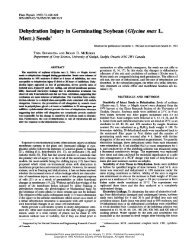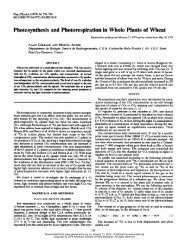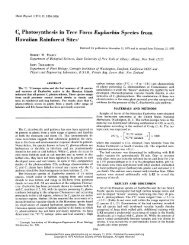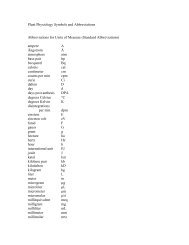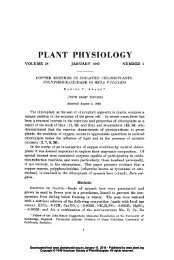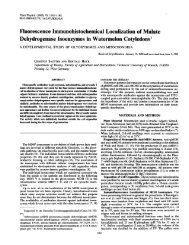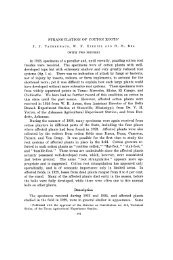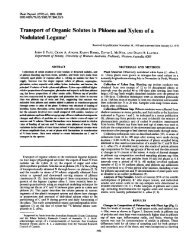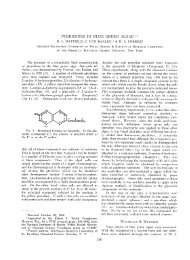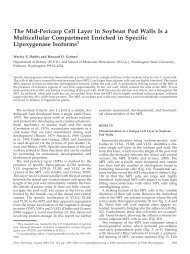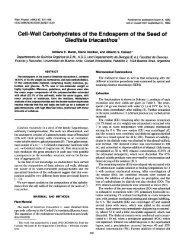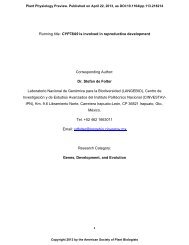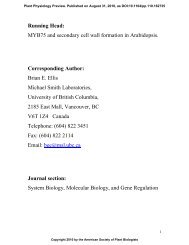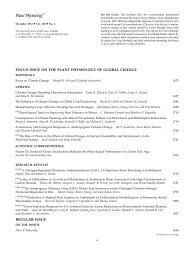Phosphoproteomics-identified ERF110 affects ... - Plant Physiology
Phosphoproteomics-identified ERF110 affects ... - Plant Physiology
Phosphoproteomics-identified ERF110 affects ... - Plant Physiology
You also want an ePaper? Increase the reach of your titles
YUMPU automatically turns print PDFs into web optimized ePapers that Google loves.
22<br />
PCR System for qRT-PCR was purchased from Promega (Madison, WI, USA). M/S<br />
basal salt mixture, sucrose, trifluoroacetic acid (TFA) and other chemicals were<br />
purchased from Sigma–Aldrich (St. Louis, MO, USA).<br />
In vitro kinase assay and PTM site quantification using iTRAQ labeling and<br />
MS/MS analysis<br />
Both the in vitro kinase assay and synthetic peptide purification were performed<br />
according to a previously described method (Li et al., 2009). Total cellular proteins<br />
were extracted from the frozen fine powders of Arabidopsis tissues using a kinase<br />
extraction buffer containing 20 mM HEPES (pH 7.5), 150 mM NaCl, 1% triton X-100,<br />
2.5 mM sodium pyrophosphate, 1 mM sodium fluoride, 1 mM sodium orthovanadate,<br />
1 mM sodium molybdate, 1 mM glycerol-2-phosphate and 1 mM<br />
phenylmethanesulfonylfluoride (PMSF) protease inhibitors mix (Roche, Switzerland).<br />
<strong>Plant</strong> cells were mixed with the kinase buffer at a ratio of 1:3 (W:V), which was<br />
incubated on ice for an additional 10 min. The plant kinase extract was then<br />
centrifuged for 10 min at 14000 × g at 4 °C to remove cell debris. <strong>Plant</strong> kinase<br />
extracts were activated by adding a 1/4 volume of kinase assay buffer [45% glycerol,<br />
2.5 mM adenosine triphosphate (ATP), 50 mM MgCl2 125 µg/mL bovine serum<br />
albumin (BSA)]. Substrate peptides were added at a concentration of 10 µM. The<br />
kinase-substrate mixture was incubated at 30 °C for 1 h. Peptides were purified using<br />
Ni 2+ -NTA agarose beads (Qiagen) according to the manufacturer’s instructions.<br />
Following overnight digestion using trypsin at 37 °C, the purified peptides were<br />
desalted with C18 Zip-tip columns and re-suspended in 0.1% trifluoroacetic acid<br />
(TFA) for liquid chromatography (LC)-MS/MS analysis.<br />
In the iTRAQ experiment, the purified <strong>ERF110</strong> peptides containing Ser62<br />
phosphosite (Supplementary Table 1) were first labeled with iTRAQ 4-Plex labeling<br />
reagent (Applied Biosystems) following the kinase assay. The isotope-labeled<br />
phosphopeptides were purified with TiO2 beads according to the manufacturer’s<br />
instructions and desalted with C18 Zip-tip columns and re-suspended in 0.1% TFA<br />
for MALDI-MS/MS analysis using a Bruker Autoflex III MALDI TOF/TOF MS<br />
/Dionex. The iTRAQ experiment was repeated on the same plant at least twice with a<br />
reciprocal labeling of iTRAQ chemicals to exclude the difference brought about by<br />
the differential labeling process. The ion intensity of the reporter ion of the air-treated



